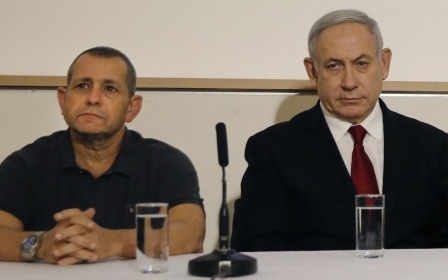Israel's judicial reform has weakened Netanyahu - but it might save him too

It’s over. Six months into the judicial reform - “regime change”, as the opposition labels it - Prime Minister Benjamin Netanyahu has chosen his coalition over his country.
In the absence of opposing MPs, who walked out before the vote, a key part of the incendiary judicial overhaul was approved by parliament on Monday - the reasonableness standard.
Just six months ago, few Israelis, including the majority of Israeli leaders who have been ferociously attacking and defending it in recent months, were familiar with the term “reasonability clause”.
That clause, which allowed the Supreme Court to overrule unreasonable government decisions, has now been expunged from Israeli law.
Netanyahu, who deemed it unreasonable for his military chief of staff to brief him on the security implications of the vote, has decided reason isn’t something for the judiciary to trouble itself with.
But perhaps that is giving Netanyahu too much weight in this fracas.
If millions of Israelis feel kidnapped by the most right-wing government the country has seen, they share the fate of Netanyahu, a prisoner of his own coalition.
The prime minister was seen sitting passively as his own ministers argued in Israel’s parliament, the Knesset, over whether to push on with the vote or not.
It does not make him less responsible, it just exposes his total and unprecedented impotence.
Tellingly, he fled the plenary hall as soon as the vote was over and left the stage to be filled by his justice minister, Yariv Levin, who was petitioned by admiring members of the coalition for endless selfies, crowning him king for the day.
Maybe not just that day. An hour after the vote, Nadav Argaman, Netanyahu’s former head of the Shin Bet domestic intelligence service, was spotted in the front row of a spontaneous protest march. “Netanyahu might have saved his coalition today, but he lost the people of Israel,” Argaman said.
‘The rest is yet to come’
It is not even entirely accurate to say that Netanyahu chose the good of his coalition over the good of the country, its security, economy and foreign relations. It’s his own good he chose.
In a rare TV interview the night before the vote, while attempts to find a compromise were still going on, former Supreme Court president Aharon Barak predicted the talks would lead nowhere.
“I’ve known Netanyahu for years. I don’t believe him anymore. Either he changed, or I did,” he said, suggesting that Netanyahu’s corruption trial lay behind the current turmoil.
“A lot of what’s happening now has to do with his ongoing trial. It started with the trial and is going to last as long as the trial lasts.” He was right on both counts.
Minutes after his victorious vote was over, Levin, the architect of the judicial reforms, announced: “We just made the first historic step on the way to fix the judiciary system. The rest is yet to come.”
Even before the rest of the legislation comes to destroy the judiciary system as we know it, cancellation of the reasonableness standard is dramatic enough, especially when adopted by this highly ideological government.
The now abolished clause is a legal tool in which courts should ask themselves: “Would a reasonable government decide the way the government decided?" Based on this clause, a court could review or decide against any government action, even if not necessarily illegal by law, just because it is unreasonable.
This is how people intuitively lead their life; this is how the Israeli judicial system has operated over 30 years. This is how the court interfered to protect citizens against arbitrary government decisions.
Unlimited power
Michael Ben-Yair, attorney general from 1993-1996, tells Middle East Eye why this government was so eager to cancel the clause:
“What they really want is to get rid of any obstacle (like the judicial system) that stands in their way to make and implement drastically unreasonable decisions.
“The Supreme Court of Justice, out of self-restraint, never interfered in matters of national policy so as not to impose its discretion over the discretion of an elected government,” he adds.
Meir Shitrit, a former justice minister from Netanyahu’s Likud party, similarly speaks plainly.
“The cancelation of the reasonableness standard is nothing less than the destruction of Israeli democracy,” he tells MEE.
“It paves the way to a total corruption of the public services. It certainly raises suspicions as to the future intentions of this government, that now has acquired unlimited power.”
This unlimited power is now in the hands of far-right factions who not so long ago were on the fringes, who do not respect limits - neither geographical, political nor human.
They, by the way, call it “governance”. But what exactly they mean by governance differs from minister to minister.
It’s relatively easy to see who the immediate beneficiaries of the reforms are: they came together in a demonstration of support for the government a day before the vote.
Most of the participants were settlers who arrived in Tel Aviv in organised transport from all over the occupied West Bank, as well as ultra-Orthodox men, who were called to the demonstration through loudspeakers that moved through their neighbourhoods.
They waved banners praising dictatorship and urging the construction of a Third Jewish Temple on the site of Al-Aqsa Mosque.
Another clear winner of the clause’s cancellation is Bezalel Smotrich, the far-right finance minister on a mission to double the number of settlers and strengthen Jewish identity (aka supremacy) with no legal supervision.
Crucial for Netanyahu
But most of all, this part of the reform is crucial for Netanyahu.
With no reasonability clause, he might still have issues trying to get rid of the attorney general, Gali Baharav-Miara. But the job has nonetheless been made easier, and he has a plan: the next step will be to divide the role of attorney general into two, a chief government legal adviser and a chief prosecutor.
Baharav-Miara has been labelled by the coalition as an archenemy. She is “more dangerous to the security of Israel than Hezbollah and Hamas”, according to one minister.
But for Netanyahu, she’s simply not compliant for his needs: he needs a friendly chief prosecutor willing to drop all charges against him and cancel the trial.
That’s the essence of this new legislation. This is why 1,500 pilots and other air force units refusing service did not matter; why hundreds of doctors going on strike did not change his mind; why the warnings of business leaders and economists went unheeded.
Twenty-nine weeks of unprecedented demonstrations all over Israel made no impact. The sight of Israeli society torn apart did not stop Netanyahu.
And Israelis know what lies at the heart of his decision. In a poll conducted last week by Channel 13, 59 percent Israelis (10 percent of them Likud voters) said they believe Netanyahu is motivated by his personal needs.
Now, the Supreme Court will hear a petition against the new law undermining it.
Jurists believe there is only a slim chance the Supreme Court will intervene over a semi-constitutional basic law.
Middle East Eye propose une couverture et une analyse indépendantes et incomparables du Moyen-Orient, de l’Afrique du Nord et d’autres régions du monde. Pour en savoir plus sur la reprise de ce contenu et les frais qui s’appliquent, veuillez remplir ce formulaire [en anglais]. Pour en savoir plus sur MEE, cliquez ici [en anglais].







